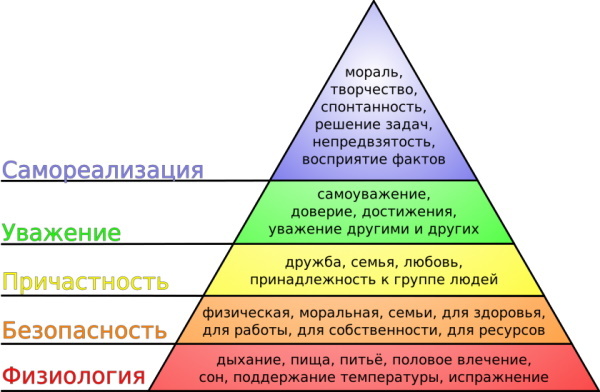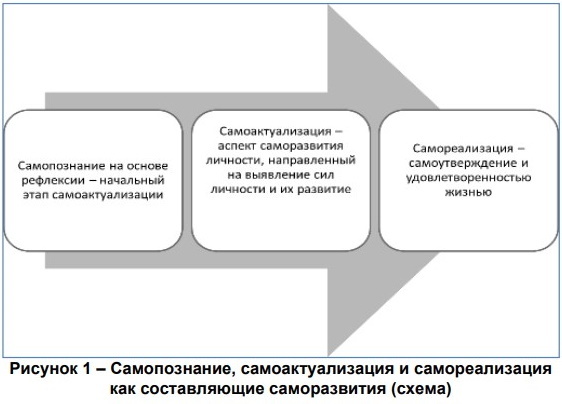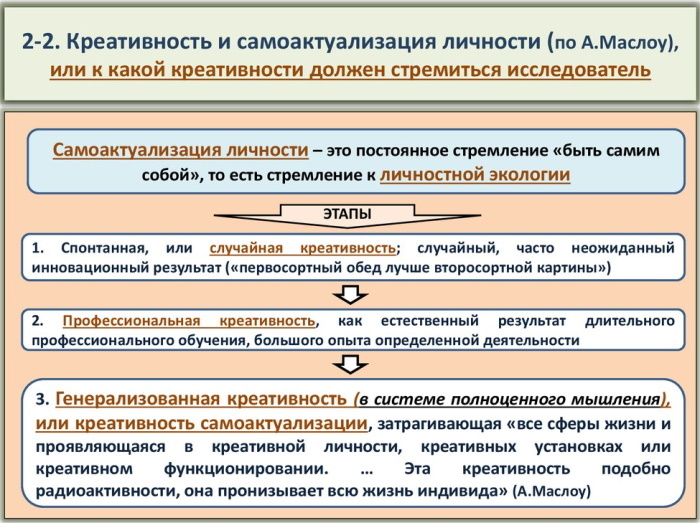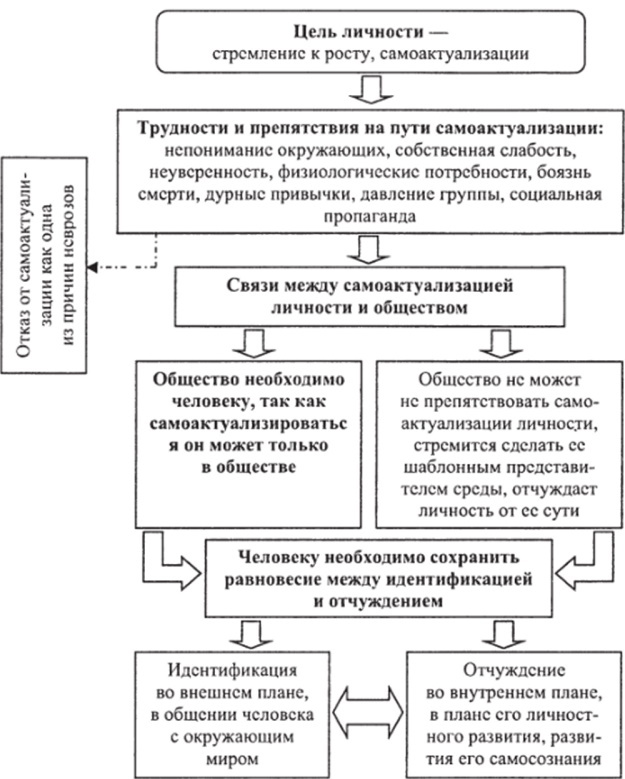Content
- The essence of self-actualization
- Maslow's theory of self-actualization
- Maslow pyramid
- Self-actualization as a process
- The need for self-actualization
- During adolescence
- Young people
- In a mature person
- Types of self-actualization in psychology
- Deep
- Superficial
- Passive
- Active
- Harmonious
- Problematic
- Cautious
- Energetic
- Stages
- Self-actualization motive
- The need for self-actualization
- Areas of the self-actualization process
- Social and political activity
- Hobbies and hobbies
- Family
- Professional labor
- Self-actualization development, examples
- What prevents self-actualization?
- Signs of a self-actualizing personality
- Self-actualization video
Self-actualization is a conscious and deep development of one's own potential, which helps to improve talent and achieve success in life. In psychology, there are several options for defining a concept, the most important of which are described later in the article.
The essence of self-actualization
Self-actualization in psychology is a process of self-knowledge and self-development, associated with a constant deepening and search for the meaning of one's own life. Despite the fact that psychologists attach different meanings and methods of achievement to this concept, its essence boils down to a single idea - the maximum disclosure of personal potential. Therefore, a person who has managed to develop a sense of authenticity is an example of a distinctive and independent individual.
Usually, the reason for the impulse of self-actualization of a personality is the doubts that have arisen in her about her own activities, the desire to deepen her understanding of the problem or mastery in any area. Self-actualization is very different from self-expression.
For example, in humanistic psychology, self-expression is perceived as something - a talent, skill or inclination - already formed and constantly repetitive, while self-actualization is a deeper process of finding your own vocation in order to realize the true nature of your desires and opportunities.
Maslow's theory of self-actualization
The theory of self-actualization, that is, how to develop one's own potential and realize one's mission, is described by various psychologists of the humanistic direction. One of them is Abraham Maslow, famous for his Pyramid of Needs Satisfaction.
The main regularity of Maslow's hierarchy is that only after satisfying basic needs, a person is drawn to higher ones. But exceptions are possible for some people: for example, self-actualization may turn out to be a more important process than satisfaction in love.

Such violations take place - Maslow's pyramid is a model for the development of human abilities, which describes the path of a person with a perfectly healthy psycho-emotional background (maturity, good education and socialization). Therefore, this scheme cannot foresee all the difficulties and pitfalls of each personality.
Self-actualization in psychology according to Maslow is a process of personal growth from satisfying material needs to higher aspirations.
In the process of this development:
- talents and opportunities are revealed;
- self-awareness improves;
- true values are formed.
The most critical moment in the self-actualization of the individual is a more complete knowledge of oneself through the acceptance of one's own nature and the development of the ability to listen to the impulses, and not the advice of society. This is exactly how, according to Abraham Maslow, the path to the inner unity of a person takes place - the basis of a formed personality.
Maslow pyramid
Initially, Maslow's pyramid described 5 stages of human development, but by the end of his life Abraham Maslow substantiated 2 more highest stages. According to this classification, a person has simple and high needs. The fundamental regularity of the pyramid is that the desire for higher needs arises only after the satisfaction of the primary, simple ones.
All human needs are innate, organized into a kind of subconscious structure, which manifests itself according to individual experience. Therefore, comparing the needs of different people, one can get rather different pictures than a single model described by Abraham Maslow:
| Maslow pyramid levels | The most important needs of each level. |
| 1. Physiological needs | food, water, sleep, warmth, sex drive, and health. |
| 2. The need for security | stability, order, protection, independence, lack of fear, confidence in the future, decent work. |
| 3. Social level, need for love and understanding | comfortable attitude, friendship, family and like-minded people. At this stage, it is important to feel accepted by others, to love and be loved. |
| 4. Self-esteem, need for respect and calling | assessment of one's own confidence and competence, status, reputation, self-acceptance, approval by others and achievement of success are important. |
| 5. Self-actualization level | the need for creativity is manifested, the development of personal harmony and a sense of beauty, the improvement of abilities and inclinations in any of the selected areas of life. |
| 6. Cognitive ability level | it is very important to realize their own skills and understanding, which help to explore the objects of interest. |
| 7. The level of aesthetic needs | achieving a certain desired harmony, satisfaction with the growth process and the disclosure of complete naturalness in their own activities. |

Despite the fact that this approach is often criticized by other psychologists, it helps to better understand how to combine personal development for a person without significant psychological deviations.
Self-actualization as a process
The concept of self-actualization is one of the main concepts in humanistic psychology, but there is no single approach to how to develop it. Different psychologists offer different methods, all of them are designed for people with different psycho-emotional states and life needs. Thus, self-actualization is more a philosophy of life than a clear plan of action.
Thus, two of the most famous humanistic psychologists, Abraham Maslow and Karl Rogers, offer completely opposite directions of self-actualization, which should lead the individual to one goal - the disclosure of the natural potential.
According to Maslow's theory, the main thing in the process of self-actualization is to release the voice of the impulse, to learn to be yourself in any situation. Therefore, all his advice is based on the combination of the desire to act and practice, that is, there is no emphasis on excessive analysis and reflection.
On the other hand, Carl Rogers argues that the process of self-actualization should be more deliberate and less spontaneous. Moreover, he lays the main emphasis on the ability to listen to himself, and not to a psychologist or counselor. Rogers believes that even as a result of successful training, in practice, self-disclosure can be negligible. or even harm if you follow instructions excessively, but do not listen to your own feelings.
Despite the fact that self-actualization is considered personal improvisation, there are basic principles for its development:
- self-actualization is always a choice and growth, even negative consequences develop a person if you are able to draw the right conclusions;
- a developing person always bears full responsibility for his actions;
- the process of self-actualization is characterized by experiences of the highest stages of euphoria;
- it is important to be able to relive all the events that happen to a person, and not close oneself from problems and ignore them;
- to be aware that the choice of development is always individual;
- develop self-confidence;
- self-actualization is always viewed through the prism of the creative process, which has its ups, peaks and falls.

This approach to self-actualization of one's own abilities allows one to develop in different areas and constantly look for something new and interesting.
The need for self-actualization
The need for self-actualization helps to find answers to doubts, to find harmony in one's own activity, regardless of the field of activity. The need for self-actualization is the desire of a person to become what he can become according to his own nature and inner choice, increasing his own competence and quality of work. Thus, artists should improve their own skills in creating paintings, musicians - in new music or more accurate performance of works.
The process of self-actualization, according to Maslow's theory, is common to all people, but because of the dissatisfaction of basic needs, few people develop to higher needs. On the other hand, psychologist Kurt Goldstein argues that the process of self-actualization can overshadow a person's most basic needs, such as food and sleep.
Equally important, self-actualization can change or begin to manifest itself over time. So, for example, it is normal that at different age periods a person will have different needs in revealing their potential.
During adolescence
During adolescence, self-actualization, as the highest need, manifests itself only occasionally. Usually at this time, the low needs of a person are satisfied and his worldview is formed.
Young people
For young people, the most urgent is the need to express themselves through those spheres of activity that will provide them with a worthy place in society. But questions about life's mission are already beginning to form. Therefore, during this period, the satisfaction of basic and higher needs is already beginning to manifest itself together.
In a mature person
For a mature person who has successfully passed all the necessary steps of the Maslow pyramid hierarchy, self-actualization becomes a priority. According to humanistic psychology, it is in adulthood that a person can achieve the desired goal of unlocking a potential that will maximize a person's skills and capabilities.
Types of self-actualization in psychology
Self-actualization is a very broad concept, therefore, different psychologists, based on different approaches to observation and criteria for assessing progress, describe this development process in different ways.  In psychology, several types of self-actualization have been formed, which depend on many personal factors of the individual.
In psychology, several types of self-actualization have been formed, which depend on many personal factors of the individual.
Deep
Deep self-actualization is the process of deliberately developing one's own potential, evaluating one's own capabilities and desires. Deep self-actualization symbolizes the meaningful development of certain qualities that help a person increase productivity. One of the results of successful deep self-actualization is the reduction of the influence of the filters of public opinion on the individual and the acquisition of independent thinking.
Superficial
Superficial self-actualization is the most common form of personal development. Usually, in this case, the analysis and assessment of one's own development is not provided, and the achievement of the result depends on external approval. Therefore, superficial self-actualization is similar to the free expression of existing abilities, rather than a search for a new depth of their capabilities.
Passive
Passive self-actualization symbolizes the preschool age of children's development, when personal growth a person (intellectual, spiritual and moral) occurs depending on the factors of influence external environment. There are no significant efforts and a development plan provided here, everything happens naturally, by itself.
Active
Unlike passive, active self-actualization is a clear plan of action, from idea to implementation of the plan. Usually it is promoted by spontaneous inspiration and the intention to bring what has been conceived to life in any kind of activity.
Harmonious
Harmonious self-actualization is another form of personal potential development. Unlike active self-actualization, harmonious is not only well thought out in its own actions and plans, but also internally comfortable and timely. An important aspect of this type of development is that harmonious self-actualization may not coincide with external circumstances.
Problematic
Psychologists call the antipode of harmonious self-actualization a problematic one, as a result of which a deterioration in mental and mental health and a decline in the individual's self-confidence are possible. This state is explained by untimely steps and development intentions.
Also, the emergence of problematic self-actualization can be influenced by public condemnation, uncertainty in the choice of the sphere of implementation and doubts about one's own abilities.
Cautious
A proponent of careful self-actualization is Carl Rogers, who argued that the best way to influence a person's development and help him discover potential is to free a person from defensive reactions, thereby improving the perception of their own needs (which, due to the pressure of society, are often oppressed in subconscious).
For careful self-actualization, gradual work on oneself and the accumulation of one's own potential for a future leap forward is also characteristic. According to this theory, although a person moves slowly in development, he makes fewer mistakes.
Energetic
A completely opposite approach to unlocking potential is offered by Abraham Maslow, who argues that energetic self-actualization is the best way to realize abilities. This approach is not characterized by a thorough analysis of the steps and consequences to achieve the goal, all that is needed is to do and learn at the same time. Therefore, it often happens that, having thought about the actions a little, a person can ruin what he undertook.
Stages
Self-actualization in psychology is an individual intention to discover talents and understand one's own purpose, therefore there are no universal stages of this process. Psychologists advise on their own, or with the support of a specialist, to determine an action plan based on personal capabilities and desires.
Usually, to do this as efficiently as possible, it is advised to devote some time to planning the stages, to meditate, to brainstorm, and only then to evaluate the potential opportunities. The stages of self-actualization do not have clear distinctions, and the single criterion leading a person to development will be his intuition.
Self-actualization motive
Self-actualization as a process of human development, which is not spontaneous and requires the application of efforts, and the expenditure of a large amount of energy and time. Therefore, questions about a person's motivation for self-actualization, that is, revealing their inner potential, is a separate issue for discussion.
The main argument in favor of motives for self-development in humanistic psychology is, according to Maslow, a certain internal need, which is not always due to public demand. Such a request, the achievement of a certain ideal, arises on the basis of the previously formed values of the individual, his subjective idea of how the world should look like.
The need for self-actualization
The need for self-actualization can arise in any area - professional, personal, religious (spiritual) or social. In order for a person's self-actualization to be successful, psychologists advise to consciously choose in which area he wants to develop his potential.
Areas of the self-actualization process
The decision on how to develop his potential should be determined by a person on his own, listening to his own aspirations and desires.
In the modern world, the sphere of self-actualization can be anything:
- politics;
- hobby;
- career;
- family;
- service to society;
- creative development.
Social and political activity
Social and political activity is often the choice of self-actualization of those individuals who are ready to develop their own abilities to manage or shape society. Usually, their main motive is the desire to make the world a better place or to improve some aspect of society.
Hobbies and hobbies
Passion and hobbies are the most striking examples of the fact that self-actualization does not always have to be materially significant. According to psychologists, this kind of disclosure of one's own potential is the most problem-free, because a hobby is always something that brings joy.
Family
Self-actualization in the family is an important developmental area for most people. According to Maslow's hierarchy, the family is one of the basic needs of every person, but as practice shows, not everyone has families or are trying to strengthen their own family.  And yet, meeting the needs of one's own family, developing harmonious relationships, common interests and resolving potential conflicts is an important achievement in life for many.
And yet, meeting the needs of one's own family, developing harmonious relationships, common interests and resolving potential conflicts is an important achievement in life for many.
Professional labor
The most frequent area of personal potential development and self-actualization is professional work. This includes not only career growth, as the most striking indicator of growth, but also the development of professional skills, or the intention to master a related profession.
Self-actualization development, examples
Self-actualization in psychology is a process of personal development that takes up most of your life, with varying success in moving forward. Regardless of the choice of direction, the simplest ways of developing self-actualization are such examples as: the ability to immerse yourself in an object, clearly visualize the plan of action and the desired result, listen to the inner voice, be sincere with oneself, are not afraid of mistakes and constantly analyze them, remember what everything is for began.
What prevents self-actualization?
Self-actualization in psychology is a non-linear process that requires an individual approach, and it can be difficult to hinder development due to various factors.
It is believed that health and the need for growth are necessary for successful self-actualization, but desire alone may not be enough.
As for the factors that interfere with personal growth, there are much more of them. Therefore, regardless of the idea of self-improvement, each person may have problems with this.
According to Abraham Maslow's theory of personality development, the main obstacles to self-actualization are:
- ignorance about their own capabilities, doubts and a sense of fear;
- pressure from social and cultural stereotypes;
- the need to violate security boundaries and sometimes take risks.
Equally important factors that hinder the process of self-actualization are potential mental disorders such as: emotional disturbances (depression, panic attacks), psychopathy or neuroses.
Signs of a self-actualizing personality
Self-actualizing personality has a set of its own and unique characteristics, depending on internal needs and instincts.
But at the same time, psychologists identify the most common qualities among them:
- a sense of integrity (inner harmony, order);
- continuous improvement of the desired qualities;
- a sense of completeness of goals;
- the ability to regulate productivity;
- the presence of spontaneity of actions, ease;
- independent thinking;
- wide perception of reality;
- acceptance of oneself and others, a sense of justice;
- ability to concentrate on the problem;
- priority on creativity and constant renewal of life trajectories;
- constant personal growth.
Self-actualization is a feeling of meaningfulness and fullness of life, which in psychology is considered an important attribute of a full-fledged personality.
Self-actualization video
Mental health and self-actualization:
